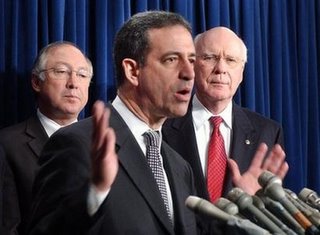 The Senate Friday, Dec. 16, 2005, rejected attempts to reauthorize several provisions of the USA Patriot Act, dealing a huge defeat to the Bush administration and Republican leaders. Senator Russ Feingold, D-Wis., center, threatened to fillibuster the measure. Flaning Sen. Feingold uring a news conference after the vote are Sen. Ken Salazar, D-Colo., left, and Sen. Patrick Leahy, D-Vt. (AP Photo/Dennis Cook)
The Senate Friday, Dec. 16, 2005, rejected attempts to reauthorize several provisions of the USA Patriot Act, dealing a huge defeat to the Bush administration and Republican leaders. Senator Russ Feingold, D-Wis., center, threatened to fillibuster the measure. Flaning Sen. Feingold uring a news conference after the vote are Sen. Ken Salazar, D-Colo., left, and Sen. Patrick Leahy, D-Vt. (AP Photo/Dennis Cook)Here's a little good news. From Yahoo News:
WASHINGTON - The Senate on Friday refused to reauthorize major portions of the USA Patriot Act after critics complained they infringed too much on Americans' privacy and liberty, dealing a huge defeat to the Bush administration and Republican leaders.
In a crucial vote early Friday, the bill's Senate supporters were not able to get the 60 votes needed to overcome a filibuster by Sens. Russ Feingold, D-Wis., and Larry Craig, R-Idaho, and their allies. The final vote was 52-47.
President Bush, Attorney General Alberto Gonzales and Republicans congressional leaders had lobbied fiercely to make most of the expiring Patriot Act provisions permanent.
They also supported new safeguards and expiration dates to the act's two most controversial parts: authorization for roving wiretaps, which allow investigators to monitor multiple devices to keep a target from evading detection by switching phones or computers; and secret warrants for books, records and other items from businesses, hospitals and organizations such as libraries.
Feingold, Craig and other critics said those efforts weren't enough, and have called for the law to be extended in its present form so they can continue to try and add more civil liberties safeguards. But Bush, Senate Majority Leader Bill Frist and House Speaker Dennis Hastert have said they won't accept a short-term extension of the law.
If a compromise is not reached, the 16 Patriot Act provisions expire on Dec. 31, but the expirations have enormous exceptions. Investigators will still be able to use those powers to complete any investigation that began before the expiration date and to initiate new investigations of any alleged crime that began before Dec. 31, according to a provision in the original law. There are ongoing investigations of every known terrorist group, including al-Qaida, Hamas, Hezbollah, the Islamic Jihad and the Zarqawi group in Iraq, and all the Patriot Act tools could continue to be used in those investigations.
I'm not saying I'm against law enforcement here. But I want safeguards to my constitutional rights and liberties in what I do or say. I don't like the idea of roving wiretaps on phones and computers, or having the feds look into what library books I read, without a search warrant. There has to be a balance between the individual's right to privacy, and the state's right of investigating and enforcing law. What worries me is that the state could investigate my own dealings, without me ever knowing of their investigations. And whatever evidence the state gathers through its investigations, could be classified as a national security secret, of which the state would admit in a court. That was my worry about the Patriot Act--it gives the state too much power at the expense of all of our civil liberties. And it doesn't matter whether the state claims it needs these powers to fight the terrorists here at home--how long will it be before the state claims it needs these Patriot Act laws to fight crime, the drug wars, anti-war protestors, or anyone else who may voice an opinion that is contrary to the state's ideology?
That is why we have a Bill of Rights--to protect against the tyranny of the state.
No comments:
Post a Comment